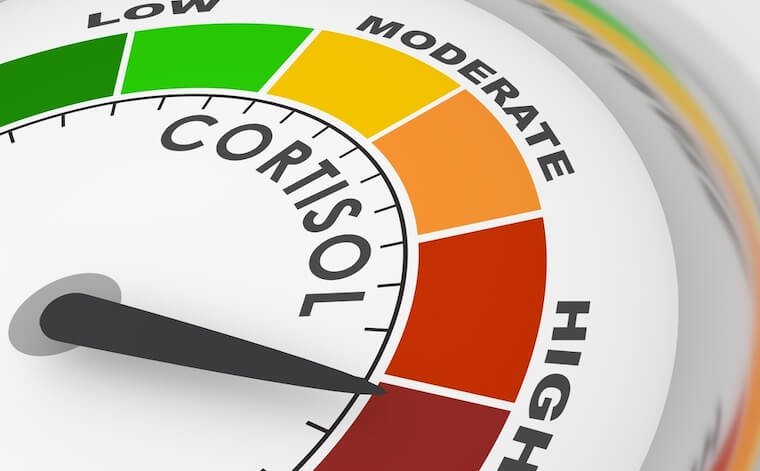Imagine a life where daily stresses don’t leave you drained, where your energy is consistently high, and your sleep is restful and rejuvenating. This could be your reality with proper cortisol management.
Often dubbed the “stress hormone,” cortisol plays a pivotal role in our body’s response to stress, but when imbalanced, it can wreak havoc on our health. This blog will explore cortisol’s essential functions, highlight its imbalance’s risks, and provide effective strategies for managing it to maintain or enhance overall well-being and vitality.
What is Cortisol?
Cortisol is a hormone produced by the adrenal glands, which are small but vital organs located above your kidneys. This hormone is fundamental in managing several critical functions in the body, including:
- Energy Regulation: Cortisol helps regulate the metabolism of carbohydrates, fats, and proteins, turning these nutrients into usable energy. This process is crucial, especially during times of stress when your body demands more energy to cope.
- Anti-inflammatory Effects: It acts as a potent anti-inflammatory, helping to control swelling and redness in the body and preventing pain and discomfort from various ailments.
- Stress Response: Known primarily for its role in the body’s stress response, cortisol increases in response to stress, providing a temporary boost in energy and alertness. This helps you navigate challenging situations more effectively.
- Sleep-Wake Cycle: Cortisol levels naturally fluctuate throughout the day. They typically peak in the morning to help you wake up, then gradually decline to allow your body to relax and prepare for sleep at night.
- Maintaining Homeostasis: After stress, cortisol plays a role in bringing various body systems back to baseline, essentially resetting the body’s internal environment to its usual calm state.
Understanding how cortisol affects these areas can help you appreciate why maintaining a balanced cortisol level is crucial for overall health and well-being. Imbalances can disrupt these systems, leading to more health issues over time.
Signs and Symptoms of Cortisol Imbalance
Understanding the signs and symptoms of cortisol imbalance is crucial, as they can vary significantly depending on whether levels are too high or too low.
When cortisol levels are elevated, it’s common to experience persistent fatigue, even after a full night’s sleep. High cortisol can also raise blood pressure, increasing the risk of heart-related issues and causing general muscle weakness due to the breakdown of muscle tissue. Additionally, mood disorders such as anxiety, depression, and irritability frequently occur, reflecting the hormone’s powerful impact on mental health.
On the other hand, low cortisol levels can lead to unexplained weight loss, as the body is unable to maintain adequate energy production. The skin may become thinner and more prone to bruising, and muscle aches and pains may become a more regular occurrence due to the reduced anti-inflammatory effects of cortisol.
Identifying these symptoms early on is essential for timely intervention, helping to mitigate the more severe consequences of cortisol imbalance.
The Double-Edged Sword of Cortisol
Recognizing whether you are experiencing high or low levels of cortisol is the first step toward restoring hormonal balance. Cortisol is vital for various bodily functions, such as responding to stress and regulating the metabolism, but its levels must be carefully managed to avoid adverse effects.
Once an imbalance is identified, the process of rebalancing involves understanding the underlying causes, which can range from lifestyle choices to physiological conditions.
Strategies for those with elevated cortisol may include stress reduction techniques, dietary adjustments, and scheduling proper sleep routines. In contrast, addressing low cortisol might involve increasing dietary sodium, using supplements prescribed by a healthcare professional, or adjusting medication.
Effective management of cortisol levels is crucial, not only to alleviate the immediate symptoms but also to prevent long-term health complications. Functional medicine offers comprehensive strategies for stabilizing cortisol levels through a holistic and individualized plan to address the root causes rather than just the symptoms.
The Functional Medicine’s Approach to Cortisol Balance
Functional medicine approaches health issues by addressing their root causes rather than just treating symptoms. When it comes to managing cortisol imbalances, understanding the intricate biological functions at the cellular level is crucial. One of the advanced diagnostic tools employed at Hyperbaric Wellness Center is the AO Scan Digital Body Analyzer, which utilizes the principles of Bio-Resonance and Sympathetic Vibratory Physics.
Each cell and organ has an optimal frequency that can indicate good health. The AO Scan works by measuring the vibrational frequencies of cells and organs, identifying any disruptions caused by factors like stress, diet, or emotions. When these vibrational frequencies are disrupted, it can lead to conditions such as fatigue, depression, and more severe diseases. By comparing the scanned frequencies with the optimal ones, practitioners can pinpoint the underlying issues in the body’s systems.
How AO Scan Enhances Cortisol Management:
- Safe and Non-Invasive: The AO Scan provides a comprehensive health scan in a non-invasive way, making it an ideal choice for patients seeking less intrusive diagnostic methods.
- Detailed Health Insights: It produces a detailed visual report of the health status of organs and systems, offering insights that are crucial for determining the specific causes of cortisol imbalance.
- Predictive and Preventive: By identifying potential health issues early, the AO Scan aids in preventative health care, allowing for interventions that can correct imbalances before they manifest as physical symptoms.
- Personalized Treatment Plans: Based on the scan results, Dr. Tony at Hyperbaric Wellness Center can develop customized treatment strategies that might include lifestyle adjustments, dietary changes, and targeted therapies aimed at restoring balance.

Embracing the AO Scan within functional medicine is like having a conversation with your body at a cellular level. This technology identifies early disruptions and provides a clear roadmap for rebalancing efforts tailored to your needs. By utilizing this advanced diagnostic tool, Dr. Tony can help design a wellness plan that targets cortisol imbalances and enhances your overall health and vitality. It’s about working together to tune your body’s natural rhythms so you feel more energized, balanced, and ready to enjoy life.
Innovative Therapies for Cortisol Regulation at Hyperbaric Wellness Center
After getting a clear picture of how your body is functioning via the AO Scan, Dr. Tony would then create a plan based on the various innovative therapies offered at the Hyperbaric Wellness Center, that are tailored specifically to address and manage cortisol levels, providing targeted support. Some of these therapies include:
- Hyperbaric Oxygen Therapy (HBOT): By increasing the body’s oxygen saturation, HBOT helps mitigate the effects of high cortisol levels, such as chronic fatigue and slow recovery from stress. The pressurized environment of the hyperbaric chamber enhances the body’s ability to carry oxygen to stressed tissues, promoting faster healing and reducing inflammation, which can be exacerbated by elevated cortisol.
- Theta Chamber Therapy to Support Adrenal Balance: This advanced therapy is designed to calm the nervous system and reduce stress by inducing a theta state in the brain. A theta state is deeply relaxing and can help lower high cortisol levels, which are often a response to acute stress or anxiety. Regular sessions can aid in resetting the body’s stress response, helping to maintain a more balanced cortisol rhythm.
Supportive Dietary and Lifestyle Adjustments:
- Dietary Adjustments: At Hyperbaric Wellness Center, we advocate for a diet that supports adrenal health and cortisol balance. Foods rich in vitamins C and B, magnesium, and omega-3 fatty acids are emphasized to support the adrenal glands and mitigate the effects of cortisol. Reducing caffeine and sugar intake is also crucial, as they can spike cortisol levels and disrupt sleep patterns.
- Lifestyle Adjustments: Engaging in regular, moderate exercise is recommended to help modulate cortisol levels. Activities like yoga and tai chi, in addition to mindful practices such as meditation and deep-breathing exercises, are particularly effective in controlling stress and, consequently, cortisol levels. Ensuring sufficient sleep and adopting relaxation techniques also play a vital role in maintaining hormonal balance.
These therapies and adjustments are integrated into our personalized treatment plans, where we focus on reducing stress and balancing cortisol levels to enhance your health and vitality.
Take Control of Your Health at Hyperbaric Wellness Center
At Hyperbaric Wellness Center, we understand the complexities of cortisol management and offer personalized therapies and lifestyle adjustments designed to help you manage stress and optimize your health.
By embracing the innovative therapies and supportive adjustments we’ve discussed, you can take significant steps to regulate your cortisol levels and improve your overall well-being. Whether you’re struggling with symptoms of cortisol imbalance or aiming to enhance your health proactively, our team is here to guide and support you every step.
Don’t let stress control your life. Contact us today to discover how you can regain balance and embrace a healthier, more vibrant future.
Disclaimer: The information provided in our blog posts is for educational and informational purposes only and is not intended as medical advice. While we strive to share knowledge and insights on health-related topics, this content should not be used as a substitute for professional medical advice, diagnosis, or treatment. Always consult with a qualified healthcare professional regarding any medical concerns or decisions related to your health and well-being.
Resources:
Amasi-Hartoonian, N., Sforzini, L., Cattaneo, A., & Pariante, C. M. (2022). Cause or consequence? Understanding the role of cortisol in the increased inflammation observed in depression. Current opinion in endocrine and metabolic research, 24, 100356. https://doi.org/10.1016/j.coemr.2022.100356
Badanes, L. S., Dmitrieva, J., & Watamura, S. E. (2012). Understanding cortisol reactivity across the day at child care: The potential buffering role of secure attachments to caregivers. Early Childhood Research Quarterly, 27(1), 156–165. https://doi.org/10.1016/j.ecresq.2011.05.005
Guerrero, J. (2017). Para entender la acción de cortisol en inflamación aguda: una mirada desde la glándula suprarrenal hasta la célula blanco. Revista Médica De Chile, 145(2), 230–239. https://doi.org/10.4067/s0034-98872017000200011
James, K. A., Stromin, J. I., Steenkamp, N., & Combrinck, M. I. (2023). Understanding the relationships between physiological and psychosocial stress, cortisol and cognition. Frontiers in endocrinology, 14, 1085950. https://doi.org/10.3389/fendo.2023.1085950
Yehuda, R. (2003). Hypothalamic–pituitary–adrenal alterations in PTSD: Are they relevant to understanding cortisol alterations in cancer? Brain, Behavior, and Immunity, 17(1), 73–83. https://doi.org/10.1016/s0889-1591(02)00070-3


